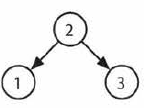BST Sequences
vector<int> sameParentLevelTrav(Node *root) {
vector<int> siblings;
queue<Node *> q;
Node *temp = new Node();
q.push(root);
int completeTreeCounter = 1;
while (!q.isEmpty()) {
temp = q.front();
q.pop();
// complete tree - siblings exist
if (temp->left != null and temp->right != null) {
siblings.push(temp->left->value);
siblings.push(temp->right->value);
}
if (temp->left != null) {
q.push(temp->left);
}
if (temp->right != null) {
q.push(temp->right);
}
}
}
vector<int> preOrder(Node *root) {
// assumming vector<int> preOrderNums is accessable in the class
if (root != nullptr) {
preOrderNums.push_back(root->value);
preOrder(root->left);
preOrder(root->right);
}
return preOrderNums;
}
vector<int> uniqueSwap(int one, int two, vector<int> &base) {
}
vector<vector<int>> BSTcombinations(Node *root) {
vector<vector<int>> finalComb;
// preorder array
vector<int> preArr = preOrder(root);
finalComb.push_back(preArr);
// analyize siblings
vector<int> siblings = sameParentLevelTrav(root);
vector<int> temp = preArr;
// find unique combinations
int swap1_i = 0;
int swap2_i = 1;
while (swap2_i > siblings.size()) {
int swap1 = siblings.at(swap1_i);
int swap2 = siblings.at(swap2_i);
// find where index exists
int j;
for (j = 0; j < temp.size(); j++) {
if (temp.at(j) == swap1) {
break;
}
}
// find where index exists
int k;
for (k = 0; k < temp.size(); k++) {
if (temp.at(k) == swap2) {
break;
}
}
// preform swap -> iter_swap <algorithm>
iter_swap(temp.begin() + j, temp.begin() + k);
finalComb.push_back(temp);
// next iteration
temp = preArr;
swap1_i += 2;
swap2_i += 2;
}
// find remaining combinations
for (int i = 0; i < pow(2, finalComb.size() - 1); i++) {
}
}Last updated
